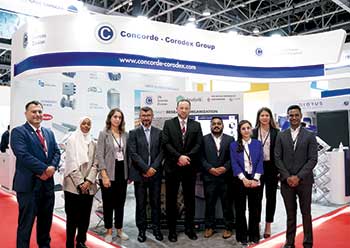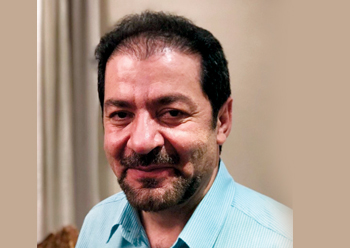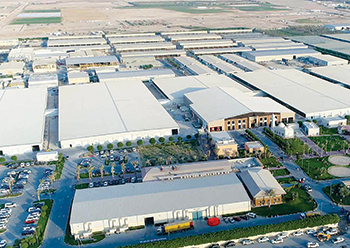
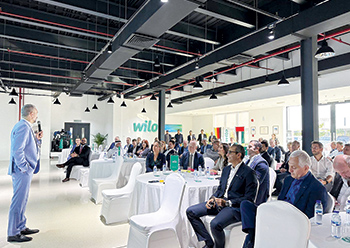 Oliver Oehms, CEO of AHK UAE addressing the gathering
Oliver Oehms, CEO of AHK UAE addressing the gathering
Leading manufacturers from around the world have collectively determined that proper waste management techniques are a critical requirement. This is due to the fact that only the manufacturer can regulate the economical and ecological recycling of products. As a result, leading companies across the globe, including Wilo, view it as a primary objective to progressively increase the reuse rate of components and materials, in order to conserve resources as much as possible.
Reducing waste through recycling can be a significant milestone for the industry, as the production of pumps also consumes a lot of resources. At Wilo, we take accountability for our products based on the tenet “Prevention and Use Before Recycling and Disposal.” In accordance with this principle, the company strives to maintain at least 30,000 components in circulation annually. With nearly 46,000 products/components produced in 2019, Wilo significantly outperformed this goal, and continues to recover old products from the market in order to drive product recycling. The process consists of several steps, starting with an analysis of all internal and external products at the on-site repair and recycling facility. Afterwards, these goods/parts are professionally repaired, reused, or recycled.
The potential recycling rate of a Wilo pump is almost 100 per cent, with almost the entire pump being capable of going back into the material cycle. Currently, the company is collaborating with leading institutions, such as the German Federal Environmental Foundation, to test processes that would make it possible for it to recover more used products in the future. More than 3,000 pumps totalling 13 tonnes in weight were collected and recycled during the pilot phase. Additionally, Wilo focuses on developing and improving its products using insights from these procedures. As a result, the company establishes a win-win scenario with the aid of these systems, which benefit the environment, as well as ensure profitability.
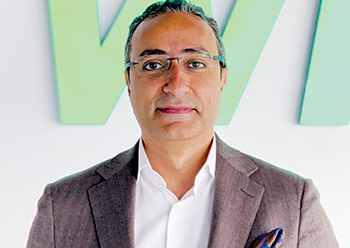 |
|
Yasser Nagi |
By 2025, Wilo expects its primary production sites to have carbon-neutral purchasing and consumption patterns for electricity. The company aims to accomplish this using three strategies, which include ensuring energy conservation through efficient measures, purchasing green electricity and producing power through the installation of clean energy technologies, and investing in climate protection initiatives. As a result of its implementation, the company has saved close to 1,032 megawatt-hours (MWhs) or consumed 1.3 per cent less energy than it did previously. Similarly, Wilo’s production sites collectively reduced their carbon emissions by 16,383 tonnes.
Another crucial area of the water industry that involves the use of pumps and high levels of electricity consumption is wastewater management. Wastewater treatment systems are designed to treat used water, so it can be recycled safely and released back into the environment. These treatment methods are now becoming more streamlined than ever, largely due to the rise of technological advancements. Despite these advances, wastewater management remains a challenge that must be closely examined and addressed.
The need for effective wastewater management has grown increasingly challenging over the years, as a result of sewage systems collecting more solid waste and having longer retention times. This makes it even more important to effectively manage sewage, sludge, and other problematic fluids at varying flow rates and delivery heads. The choice of pumps and piping should also be carefully considered, as it can have a significant impact on the amount of energy used over the system’s lifetime. Plumbing should be engineered to minimise friction loss, and pumps should be chosen to operate at their Best Efficiency Point (BEP). Due to these reasons, the ongoing need for clean water increases the pressure on sewage treatment facilities to find more effective and reliable water purification methods.
The three main approaches that could propel a new, sustainable trend in water treatment systems are operational reliability, energy efficiency, and connectivity. Wilo achieves this by incorporating smart energy-efficient systems into pumps and water treatment systems, which can optimise operations and lower electricity usage. These issues can also be monitored by several algorithms using new technologies such as clogging detection functions, which can initiate the necessary pump cleaning cycles and deliver the best possible results.
Many communities around the world continue to be in need of clean and efficient wastewater treatment. It is a reality that would need proper investments and coordinated efforts between the governments, private sector, and civil society. Companies today can enhance the existing frameworks and develop novel strategies to guarantee long-term water management that benefits more people. Wilo offers a diverse range of energy-efficient solutions, in order to help companies in the UAE and the Middle East run their operations as efficiently as possible. The company seeks to address issues that arise in the water and energy sectors by deploying sustainable and effective solutions.

